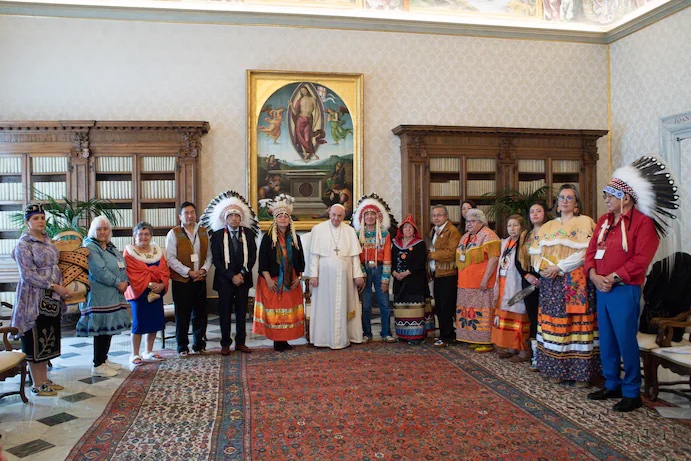
By Stefano Pitrelli & Amanda Coletta
After years of resisting such calls, Pope Francis on Friday apologized for the “deplorable conduct” of some Catholics in Canada’s residential school system for Indigenous children, saying he was “deeply grieved” by the stories of “suffering, hardship, discrimination and various forms of abuse” from survivors.
Speaking to an audience that included an Indigenous delegation that traveled from Canada to the Vatican this week to press for an apology, Francis said he felt “shame” for the role Catholics have had “in the abuses you suffered and in the lack of respect shown for your identity, your culture and even your spiritual values.”
“All these things are contrary to the Gospel of Jesus Christ,” the pope said at the Apostolic Palace. “For the deplorable conduct of these members of the Catholic Church, I ask for God’s forgiveness and I want to say to you with all my heart: I am very sorry. And I join my brothers, the Canadian bishops, in asking your pardon.”
Francis also reiterated a pledge made last year to visit Canada, where he said he would be “better able” to show his “closeness.”
The pope has been under renewed pressure to apologize for the Church’s role in the residential school system after several Indigenous communities in Canada in the last year said that ground-penetrating radar had uncovered evidence of hundreds of unmarked graves at or near the sites of former schools.
Beginning in the 19th century, at least 150,000 Indigenous children were separated from their families — often by force — to attend the government-funded, church-run institutions, which were set up to assimilate them in what Canada’s Truth and Reconciliation Commission said in a 2015 report was “cultural genocide.”
The report said children were punished for practicing their traditions or speaking their languages, and that many suffered various forms of abuse. It identified thousands of children who died at the schools, including from disease, malnourishment, by suicide or while trying to escape. Some were buried in unmarked graves.
The last school closed in the 1990s. Most were run by Catholic entities. The Anglican, United and Presbyterian churches of Canada, which ran some schools, have apologized for their roles. But while some Catholic entities and local church leaders had apologized, Francis and his predecessors had not done so before Friday.
A papal apology on Canadian soil was among the Truth and Reconciliation Commission’s 94 calls to action.
In his remarks, Francis said it was “chilling to think of determined efforts to instill a sense of inferiority, to rob people of their cultural identity, to sever their roots and to consider all the social and personal efforts that this continues to entail: unresolved traumas that have become intergenerational traumas.”
Francis met separately this week with Métis, Inuit and First Nations delegates. The delegation, whose visit was delayed by the pandemic, was made up of Indigenous leaders, elders, youth and residential school survivors, who shared stories of their residential school experiences and the effects that still ripple in their communities.
The delegates also pressed Francis to release records that could shed light on the identities of the children who died at the schools or went missing. Some have also criticized the Church for failing to meet its obligations under a class-action settlement with residential school survivors from 2006.
Others have called on the Vatican to revoke papal bulls of the 15th century that enshrined what’s known as the doctrine of discovery, which were used to justify colonization in the Americas.
As he often does, Francis on Friday lamented “the many forms of political, ideological and economic colonization” that “still exist in the world, driven by greed and thirst for profit, with little concern for peoples, their histories and traditions, and the common home of creation.” He did not revoke the papal bulls.
During a visit this week to an Indigenous community in British Columbia that last year said it had uncovered evidence of 93 possible unmarked graves, Prime Minister Justin Trudeau — who personally appealed to Francis for an apology in 2017 — said dealing with this “terrible” chapter of history required a response from the pope.
The federal government issued an official apology for its role in the residential school system in 2006.
Francis did not provide a date for his visit to Canada, but joked that it would probably not be in winter. He said he derived “joy” from the veneration of the delegates for St. Anne and “hoped” to be with them on her feast day. It’s in July.
Complete Article ↪HERE↩!
